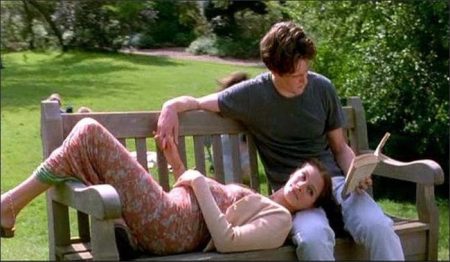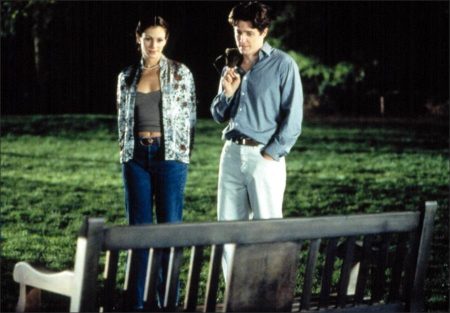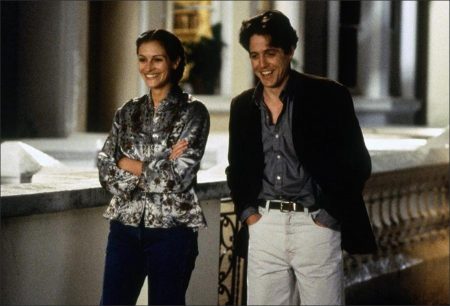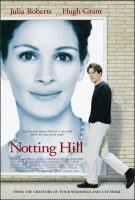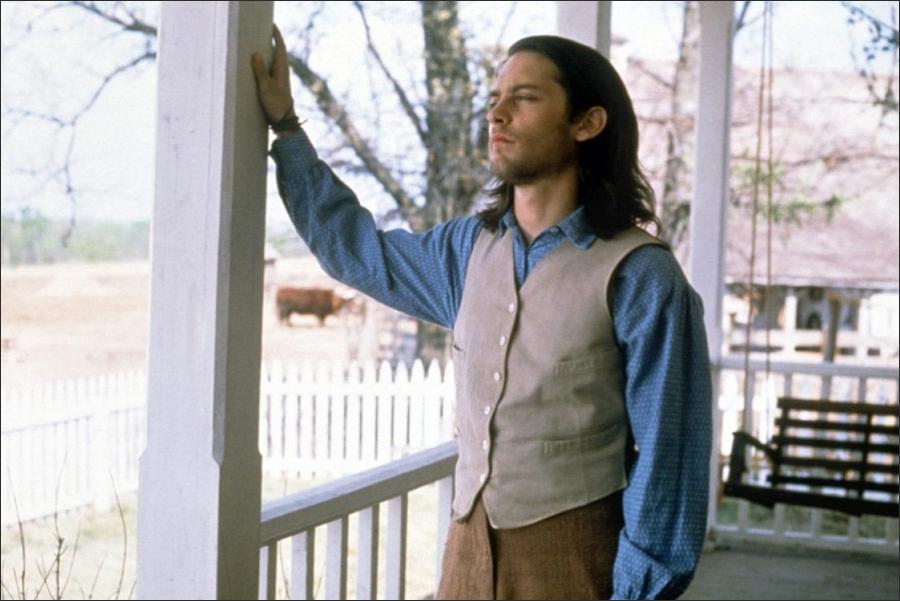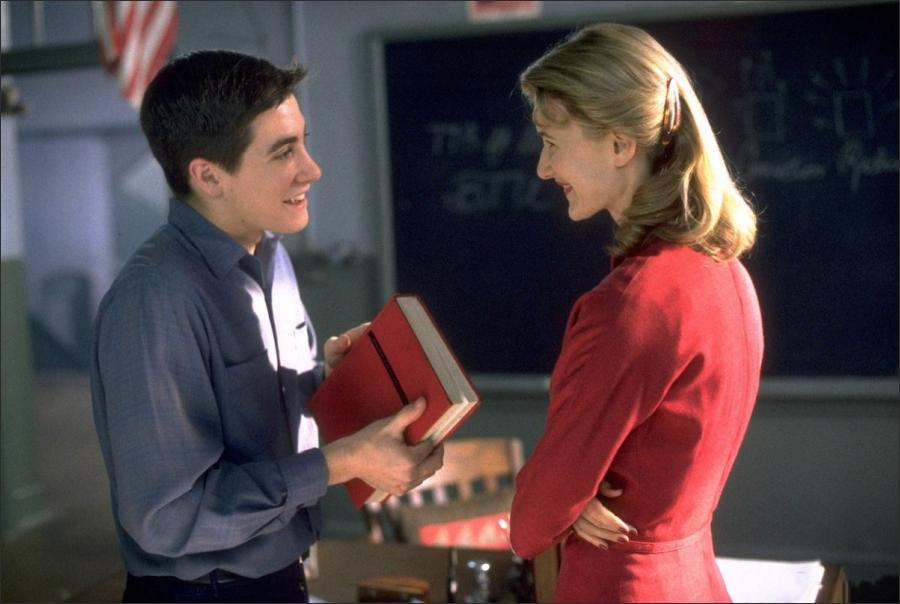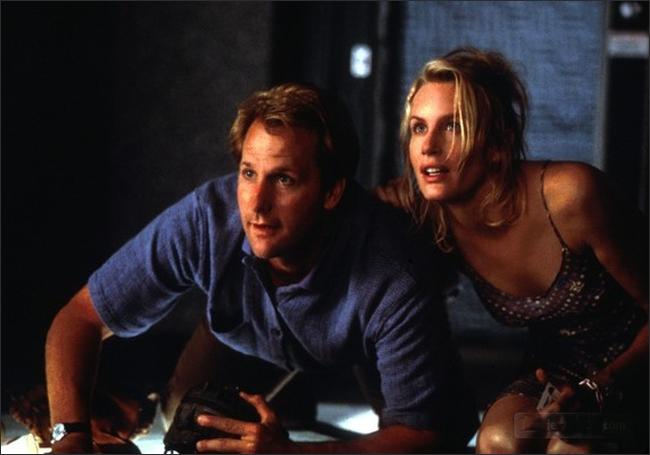Taglines: Can the most famous film star in the world fall for just an ordinary guy?
Notting Hill movie storyline. Every man’s dream comes true for William Thacker, an unsuccessful Notting Hill bookstore owner, when Anna Scott, the world’s most beautiful woman and best-liked actress, enters his shop. A little later, he still can’t believe it himself, William runs into her again – this time spilling orange juice over her.
Anna accepts his offer to change in his nearby apartment, and thanks him with a kiss, which seems to surprise her even more than him. Eventually, Anna and William get to know each other better over the months, but being together with the world’s most wanted woman is not easy – neither around your closest friends, nor in front of the all-devouring press.
Notting Hill is a 1999 British romantic comedy film set in Notting Hill, London, released on 21 May 1999. The screenplay was by Richard Curtis, who had written Four Weddings and a Funeral (1994), and the film was produced by Duncan Kenworthy and directed by Roger Michell. The film stars Hugh Grant, Julia Roberts, Rhys Ifans, Emma Chambers, Tim McInnerny, Gina McKee, and Hugh Bonneville.
Notting Hill was well received by critics and became the highest grossing British film released that year. The film won a BAFTA, was nominated in two other categories, and won other awards, including a British Comedy Award and a Brit Award for the soundtrack.
Music was composed by Trevor Jones. Several additional songs written by other artists include Elvis Costello’s cover of the Charles Aznavour song “She”, Shania Twain’s remixed version of “You’ve Got A Way”, as well as Ronan Keating’s specially recorded cover of “When You Say Nothing at All”; the song reached number one in the British charts. Pulp recorded new song “Born to Cry”, which was released on the European version of the soundtrack album.
The song played when Will strides down Portobello Road is “Ain’t No Sunshine” by Bill Withers. Tony and Bernie play “Blue Moon” on the piano at Tony’s restaurant on the night it closes. Originally, Charles Aznavour’s version of “She” was used in the film, but American test screening audiences did not respond to it. Costello was then brought in by Richard Curtis to record a cover version of the song. Both versions of the song appear in non-US releases. The soundtrack album was released by Island Records.
Film Review for Notting Hill
Films are there very largely to give you pleasure: they are pleasure-giving devices, and if a film succeeds in giving you pleasure, shouldn’t you have the courage of your convictions and own up to it? So it is with mixed feelings that I nominate Notting Hill in this category, directed by Roger Michell and written by Richard Curtis — his 1999 followup to the 1994 smash-hit Four Weddings and a Funeral. It is widely panned but I enjoy it, and whenever it is showing on ITV4 as I flick channels I always find myself stopping to watch. It was in fact the first film I ever wrote about for the Guardian.
It is the story of a shy, floppy-haired bookshop owner (Hugh Grant), a lonely divorced guy who has a wacky Welsh mate called Spike (the role made Rhys Ifans a star) and who falls in love with a Hollywood A-lister, played by Julia Roberts. His heart gets broken. So does hers. Then they get unbroken.
All right, it is undoubtedly a bit cheesy and slushy. Richard Curtis himself comes in for a lot of criticism generally, despite the enduring popularity of his Comic Relief charity. He is continually accused of making London look like a sanitised, poshified and sucrose-enhanced romcom-parody of the actual city, and the seed of that accusation was probably planted with this film.
At the time, I, along with many others, pointed out that it concentrates on the well-off world of yuppie Notting Hill and somehow never mentions the carnival, despite a montage scene that specifically shows lovelorn Hugh Grant mooching about the streets all the year round. Moreover, Notting Hill always gets derided by Curtis fans themselves, who claim that Four Weddings is the better movie, a claim that boils down to the fact that it has a funeral in it, therefore it is partly about death, and therefore it is more serious and substantial.
I don’t agree. Notting Hill is, in its contrived way, a very romantic film, with an intense, heartfelt quality: I have often wondered how much it was based on a real experience of “morganatic” romance between celebrity and civilian. I am sorry and ashamed to say that on first viewing, I failed to spot Mr Curtis’s witty allusion to Roman Holiday, right down to the press conference scene at the end. Having now had 15 years to watch terrible romcoms in the course of duty, I can see how very many screenwriters, both British and American, have tried to imitate the Richard Curtis touch — and failed.
We get some very clever moments. Julia Roberts’s movie star, Anna Scott, realises that the only way she can get an intimate meeting with Grant, and to conceal their affair from the papers, is to hide him in plain sight, to get him to come to a press “junket” at a London West End hotel and pretend to be one of the many journalists lining up for interviews with her. It is a good scene, and well-observed: the watchful PRs, the submissive interviewers, the photocopied press handouts, it is all pretty faithfully rendered, a very real part of the film-making world that I have never seen in any other film.
There are passionate speeches from Julia Roberts — it is, I think, her best film, so much better than the tiresome August: Osage County. Her ferocious denunciation of the hated British tabloids who finally discover the truth (“I will regret this for ever!”) has a real anger quite absent from other romcoms. And her tearful, devastated expression when Grant tells her that he does not want to be with her is very well done. Notting Hill is not a guilty pleasure, but an entirely innocent one.
Notting Hill (1999)
Directed by: Roger Michell
Starring: Julia Roberts, Hugh Grant, Hugh Bonneville, Emma Chambers, James Dreyfus, Rhys Ifans, Tim McInnerny, Gina McKee, Lorelei King, Mischa Barton
Screenplay by: Richard Curtis
Production Design by: Stuart Craig
Cinematography by: Michael Coulter
Film Editing by: Nick Moore
Costume Design by: Shuna Harwood
Set Decoration by: Stephenie McMillan
Art Direction by: Andrew Ackland-Snow, David Allday, John King
Music by: Trevor Jones
MPAA Rating: PG-13 for sexual content and brief strong language.
Distributed by: Universal Pictures
Release Date: May 21, 1999
Hits: 139
